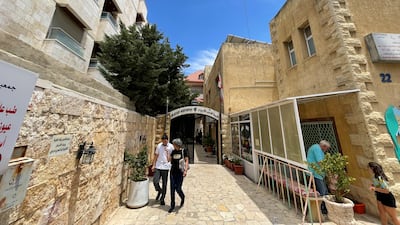In a country where the average age is 24, Jordan's medical profession skews young, but in one clinic it is the older doctors who are providing vital care.
Take Dr Elias Abu Yaghi, who was performing eye surgery almost five decades ago in Angola as the country was sliding into civil war. The upheaval forced him to go back to Spain, from where he obtained his ophthalmology degree. In 1974, he returned permanently to Jordan, leaving his work at a hospital in Granada. He is still practising today.
“I was good at research, and fluent in English and French. They wanted me to stay, but I loved my homeland,” says Dr Abu Yaghi.
He is one of more than a dozen veteran physicians at the Saint Luke centre in Amman, which charges patients low fees and waives them for many who cannot afford to pay. For the cash-strapped it is a vital fallback in a system where younger doctors are invested in modernisation and offering lucrative treatment places.
The expertise and affordability of St Luke's positions the centre as an alternative to expensive private practices and often-crowded Jordanian state clinics, which are difficult to access for refugees and foreigners.
Jordan ranks 81 out of 137 countries in the World Economic Forum index in terms of infant mortality, and 78th for life expectancy.
Within the Arab Levant, Jordan’s healthcare system, together with Lebanon’s, is widely seen as one of the most advanced.
But income per head in Jordan was $4,103 in 2021, World Bank data shows, making a visit to a private doctor expensive for most people in the kingdom.
Ophthalmologists charge a minimum of $45 for a consultation, double the fee at St Luke's, which is administered by the Orthodox Church.
“Anyone of any creed is welcome here,” says Dr Abu Yaghi, recalling his own family history.

His ancestors fled a sectarian war in Mount Lebanon in the 19th century to Palestine, and from there to Jordan during the Arab-Israeli war of 1948. His son, Nakhle, a Mayo Clinic graduate, also went back to Jordan. He heads the Ophthalmology Division at Jordan University Hospital in Amman.
When he came back to Jordan, Dr Abu Yaghi worked for several years as an army doctor, and then opened a private clinic in downtown Amman.
He says ophthalmology in Jordan has advanced massively, and that many types of eye surgery are done in Amman as well as in Washington.
“Ultimately the patient can look into the doctor’s eyes and know how sympathetic the doctor is,” says Dr Abu Yaghi, whose father was a mechanic.
One patient comes in for a routine check-up. Dr Abu Yaghi starts by asking him whether he takes medication for diabetes, blood pressure or blood thinners. He asks him if he smokes.
He then checks the inside of the man's eyes, and asks him to read from the vision chart.
“You passed. You just have dry eyes,” the doctor says, before prescribing Japanese eyedrops.
Like mobile phones, eyedrops keep improving, he says.
Veteran doctors plug gap in Jordan's health care - in pictures
St Luke's opened in 2008, after donations that included significant financing from the late Karam Imseeh, a refugee from Palestine who became a prominent jeweller in Jordan.
Father Bagus Kfouf, the oeconomus (manager) of the centre, hopes the church can build upon the success of its clinics by opening a fully fledged hospital, similar to the Saint George, a university hospital in Beirut affiliated with the Orthodox Church there.
“It is is our dream. It will take lots of resources,” he says.
Dr Abu Yaghi is one of the centre’s founders. Several years ago, he convinced a colleague and friend, bone surgeon Hanna Theodosi, to join St Luke's.
Dr Theodosi, an only child, graduated in Hungary in the 1980s, and returned to Amman to be with his father, Emile, who had also fled Palestine in 1948.
Many of his patients are domestic workers, such as a Filipino woman who came to see him because of shoulder pain. Others, such as Marwa, a former expatriate in Dubai, are relatively well off and are familiar with Dr Theodosi's established reputation.
Dr Theodosi says he goes out of his way to make the foreign labourers feel “very secure”.
“They are our guests,” he says.







